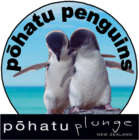Rehabilitated penguins at Pohatu bay.
|
The 2017 – 2018 breeding season has been a tough one. This year our penguins have faced two major challenges that have significantly impacted the colony, La Nina and the Northern Giant Petrel. Because of these challenges our rehabilitation program was at full capacity; at its peak, we had around 15 penguins in care at one time. 15 penguins x 10 anchovies per feeding x 3 feedings per day = a lot of fish and a lot of work! Although it was a rough year at sea, we had a very successful rehabilitation season and released over 30 penguins back into the wild with only one placed into permanent care! La Nina: La Nina is one phase of the greater weather pattern, El Nino, which effects the entire Pacific basin and beyond. Both La Nina and El Nino are naturally occuring events that happen irregularly every 3 - 5 years. These events are caused by trade winds and ocean currents that in turn affect ocean temperature, humidity and rainfall world wide. In New Zealand, it warms our coastal waters, brings dry, hot weather to the south and rain in the north/northeast. Although La Nina occurs naturally, it has massive impacts on wildlife and this year has been especially devastating. When surrounding waters warm it means that fish either dive deeper or migrate elsewhere to colder waters. Predators, including penguins, then must swim deeper and or farther in order to hunt, exerting more energy than ever before. When La Nina occurs during the breeding season parent penguins cannot sufficiently feed themselves and their chicks. They either give up on their young or only feed them periodically. Unfortunately, this year we have found many abandoned, underfed and desperate chicks.* Find out more about La Nina’s impacts in 2017-2018. https://www.niwa.co.nz/climate/seasonal-climate-outlook/seasonal-climate-outlook-december-2017-february-2018 *Information received from New Zealand Geographic @ www.nzgeo.com/stories/la-nina/ Northern Giant Petrel: The Northern Giant Petrel is a large sea bird weighing on average 3 – 5kg and is 80 – 95cm in length. Their habitat and distribution ranges from subtropical to subantarctic in the 28 °-60 °S latitude. In New Zealand they breed at the Auckland, Campbell, Antipodes and Chatham Islands. They are also known as “Sea Vultures” as they typically scavenge for ocean carrion. They do, sometimes, prey on penguins and albatross chicks as well. This year, however, it seems as though a few Petrels have decided to soley prey on the Pohatu colony penguins. Even more devastating, they have seemed to teach their chicks to do the same. This poses a major issue as Petrels are also a protected bird with the Department of Conservation status of “At Risk/Recovering”. * We are not sure why these Petrels have decided to abandon their scavenging lifestyle – perhaps there is less carrion at sea or perhaps Flea Bay offers an endless buffet – either way they have had detrimental impacts on our colony; leaving many chicks orphaned and some adults permanently injured. *Information received from New Zealand Birds Online @ www.nzbirdsonline.org.nz/species/northern-giant-petrel. Signs of Impact This year we have seen numerous chicks, less than 8 weeks old, going to sea during the day. This is a major red flag that indicates starvation. Chicks 1 – 7 weeks old should not leave their nests, especially during the day. The natural fledging age is 8 weeks old in which chicks leave the nest in the evening – protected by nightfall. The only reason a chick may prematurely abandon the nest is from predation or to find food - something that they are not yet equipped to do. When a chick is less than 7 weeks old they still have their down feathers; these feathers are not well-insulating nor waterproof. Hence, if a young chick goes to sea they more than likely will freeze, drown or starve. Again, even though the penguins faced great odds this year, they have overcome these odds with a little bit of help and perseverance. We’re hoping to see many of our successfully fledged chicks return the following year and continue to live their lives in the Pohatu Marine Reserve! |
     |

